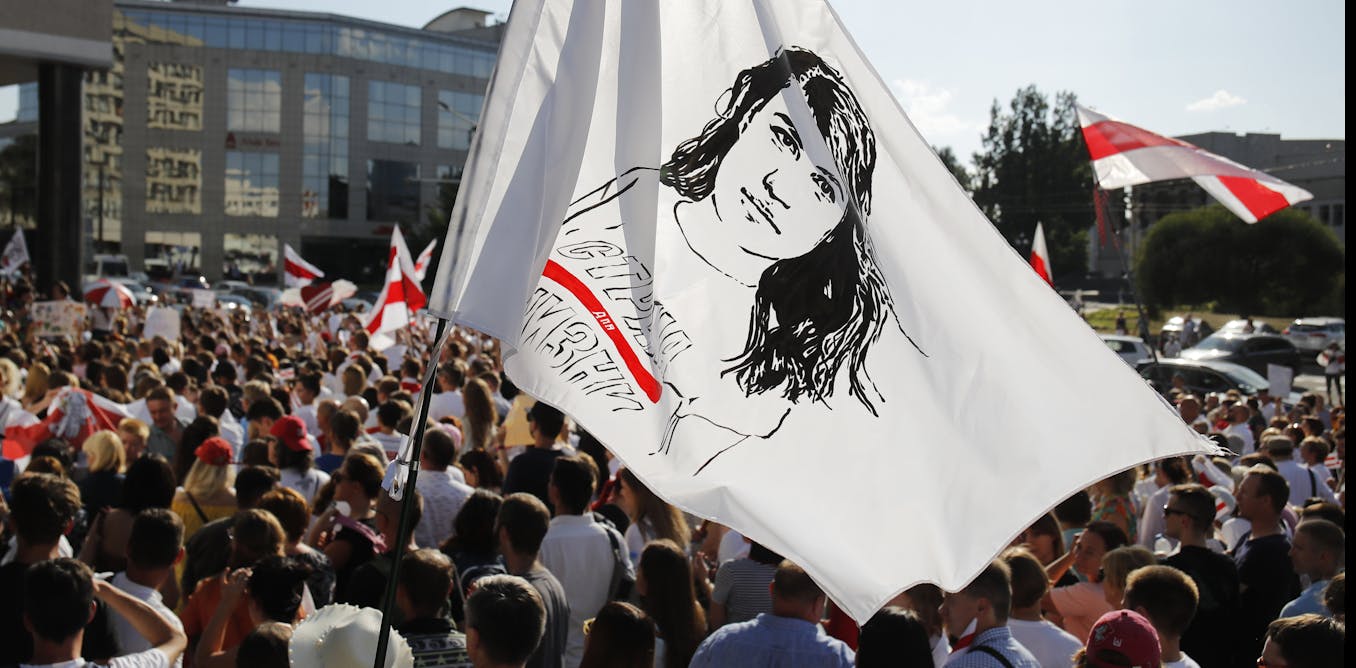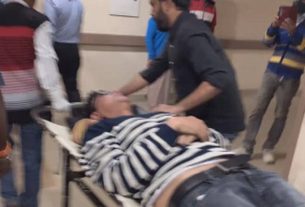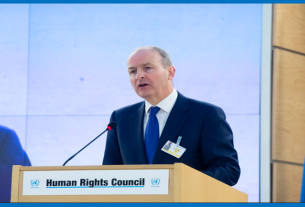Twenty political analysts are on trial in absentia in Belarus, accused of trying to overthrow the 30-year regime of Belarusian President Alexander Lukashenko.
All live outside Belarus. The accusation links them to exiled opposition leader Sviatlana Tsikhanouskaya.
What is the purpose of the trial in Minsk and what are its likely consequences?
Contested 2020 election
The proceedings are linked to the presidential elections of 2020. Mass protests followed the Central Election Commission declaration of Lukashenko as the winner with more than 80 per cent of the vote.
The protests lasted several months, resulting in more than 30,000 arrests. Lengthy prison sentences followed for presidential candidate Viktar Babaryka, his campaign manager Maria Kalesnikava and dozens who remained in Belarus.
(AP Photo/Markus Schreiber)
Tsikhanouskaya ran against Lukashenko after the detention of her husband, Siarhei Tsikhanouski, a popular video blogger. Her campaign attracted wide support, with tens of thousands attending her rallies.
The election galvanized the quiet republic as citizens demanded a change of leadership. Women, pensioners and other groups took to the streets to protest the Lukashenko dictatorship’s failure to address the COVID-19 pandemic and the country’s economic downturn.
Tsikhanouskaya remained active in exile, visiting various countries as the representative of Belarus. She created a shadow cabinet and offered an alternative democratic vision for the future.
Crackdown on critics
Lukashenko’s regime has arrested rival leaders and co-ordinated its policies with Vladimir Putin’s Russia. Its 2021 constitution is modelled on Russia’s, abandoning its former non-nuclear status. Russia has delivered tactical nuclear weapons to Belarusian territory.
Prior to the February 2024 parliamentary elections, the prosecutor’s office shut down all opposition parties, leaving only four government parties to run. It dissolved the Belarusian Popular Front (BPF), the country’s oldest opposition party. The BPF had introduced Belarus’ national symbols, including the country’s red and white flag that was later rejected by Lukashenko.
Earlier, the government shut down all independent media, as well as 1,600 non-governmental agencies, though it has been unable to curtail all social media outlets.
Having silenced critics at home, Lukashenko is now seeking to do so abroad. But there are several caveats to his simplistic accusations.
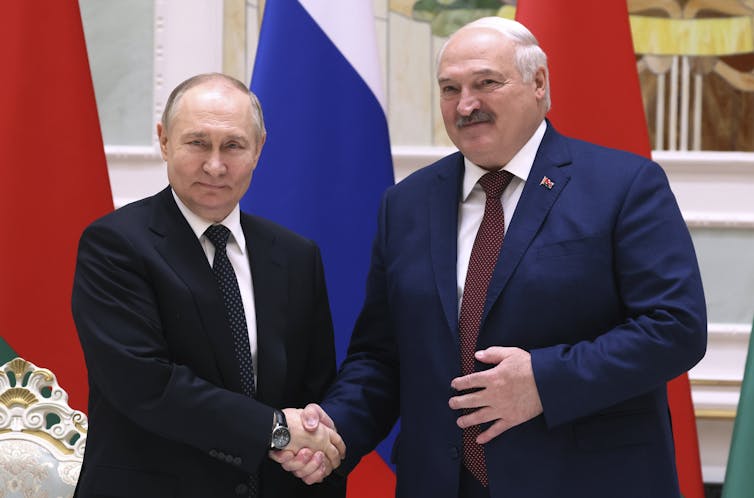
(Mikhail Metzel, Sputnik, Kremlin Pool Photo via AP)
A sham trial
First, the accused are not all part of Tsikhanouskaya’s team, like her chief adviser, Franak Viacorka. They also include young intellectual Belarusian elites and prominent journalists.
Second, this is not a trial in the western sense of the word. There is no contact between the accused and their appointed lawyers. The government provided no notice of the date of the trial.
Belarusian journalist Hanna Liubakova reports that her attorney was appointed without her knowledge and refused to send her documents about the case. The Minsk Regional Court also refused permission for her to appear at her trial on video, a familiar practice during COVID-19.
Third, the accusations have little basis in reality. As one of the accused, Tsikhanouskaya adviser Alexander Dobrovolski, explains:
“Now there is no law. They can give any punishment for anything. If someone was guided by the law, this case would not exist. Because it is simply ridiculous that people who wrote analytical or journalistic articles were suddenly united in some hostile community. There is nothing hostile in the attitude of these people towards Belarus. On the contrary, I think they are patriots of Belarus.”
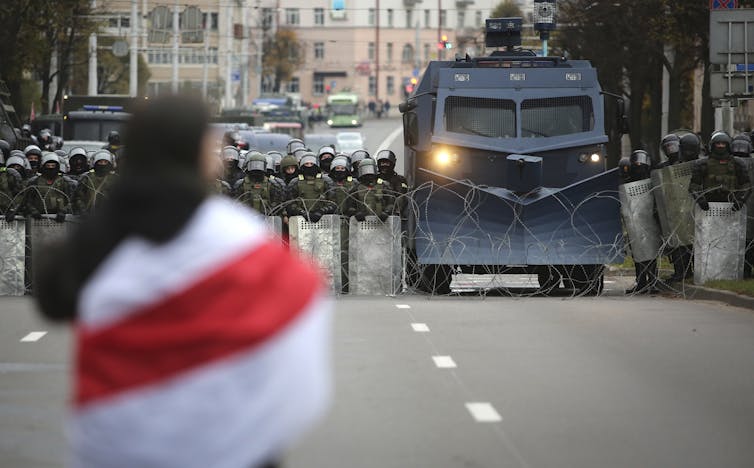
(AP Photo)
Repercussions for the accused
It might seem that since the accused are all outside Belarus, the consequences of the probable lengthy prison sentences will be minimal. But many report privately that authorities have visited their family’s homes, threatening their parents and siblings.
According to accused scholar Veranika Laputska — my collaborator on several academic projects — a guilty sentence renders any of the 20 susceptible to arrest by Interpol, the international police organization, in other countries.
Above all, the regime is attempting to sever connections with the homeland. Belarus no longer accepts passport renewal in foreign countries. But those who return home face arrest if they are known to have protested against or criticized the regime.
A protest is defined as anything from carrying a placard to liking a critical comment on Facebook. Belarusian scholar Katsiaryna Shmatsina recently told me she’s relieved to be clearly defined as being on a black list so she knows not to return to Belarus, although she regrets being unable to attend funerals of relatives.
The Russian invasion of Ukraine complicated life for the exiles. It began from Belarus; Lukashenko allowed the Russian army to use his country as a military base. As a result, some governments treat the Belarusian exiles as agents of a hostile power.
Lukashenko survives
Lukashenko’s dictatorship is insecure. Western sanctions restrict Belarusian exports to the European Union.
Lukashenko also has limited foreign contacts. Shunned by the Europeans, British and North Americans, his recent trips included visits to the Central African Republic and Mongolia, countries with which Belarus has no trading links.
Mostly, he visits Moscow to meet Putin.
Lukashenko nonetheless survives. As long as he remains in power, the alleged offenders and thousands of their compatriots must build lives in exile. Although the 2020 elections demonstrated the desire for change, it didn’t happen.
Why not? Because the country’s armed forces remained mostly loyal to their leader and workers declined to carry out a mass strike. The exile of the opposition leader further weakened resistance. And lastly, Russia offered military support to prop up Lukashenko — as it will undoubtedly continue to do so indefinitely.
